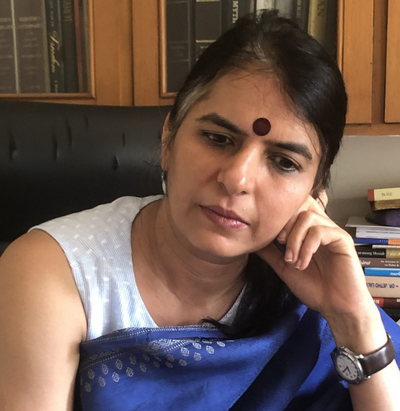What would be the origins, scope, and variety of literature produced in India? Was there always an “India”? This course begins with these questions and takes students through milestone moments of literature-making. Traversing different genres and languages from ancient times to the present day, the scope of this course is vast, for it has the provision of including a Buddhist nun’s verses from the sixth century BCE to Khalid Jawed’s The Paradise of Food (translated from Urdu by Baran Farooqi; awarded the JCB Prize in 2022). Clearly, it is not possible to expose the students to this entire range. However, the course aims to kindle profound interest in the intersections of languages and themes, the forms and genres that characterise the loosely named body called “Indian literature/s.” We will go from the ancient to medieval, colonial to modern and postcolonial body of writing—sometimes in detail, sometimes not. It would be difficult to say what gives unity, if any, to this body and whether this “body” is discursively formed through its users who read literature from Indian languages in English. The course examines the politics around such archives and the interrelationship between English and the bhashas. While the politics of language and translation underpin the instructor’s theoretical approach, the course is committed to understanding the questions of history, region, community, caste, and region-making politics in India.
Week 1:
Introduction
Week 2:
Bharti, Dharamvir. Andha Yug: The Age of Darkness. Translated by Alok Bhalla. University of Hawai’i Press, 2010.
Bhalla, Alok. “Defending the Sacred in an Age of Atrocities: On Translating Andha Yug.” In Andha Yug: The Age of Darkness. Translated by Alok Bhalla. University of Hawai’i Press, 2010.
Week 3:
Sawhney, Simona. “The Lure of Violence: Dharamvir Bharati's Andha Yug.” In The Modernity of Sanskrit. University of Minnesota Press, 2008.
Ramajunan, A. K. “Is There an Indian Way of Thinking: An Informal Essay.” In The Collected Essays of A. K. Ramanujan. Edited by Vinay Dharwadker. Oxford University Press, 2006 [1999].
Week 4:
Selections from Therigatha: Poems of the First Buddhist Women. Translated by Charles Hallisey. Murty Classical Library of India, 2015.
Mahadevi, Akka. “Vachanas of Akkamahadevi.” Translated by H.S. Shivaprakash. India International Centre Quarterly, Vol. 30, No. 3/4, pp. 32-37.
Ramajunan, A. K. “On Women Saints.” In The Collected Essays of A. K. Ramanujan. Edited by Vinay Dharwadker. Oxford University Press, 2006 [1999].
Selections from The Gitagovinda of Jayadeva: Love Song of the Dark Lord. Translated by Barbara Stoler Miller. Motilal Banarsidass, 1984 [1977].
Kachru, Sonam. “The Meaning of Love: Insights from Medieval South Asia.” History of Emotions, Max Planck Institute.
Orsini, Francesca (ed.). “Introduction.” In Love in South Asia: A Cultural History. Cambridge University Press, 2007.
Week 5:
Selections from Shah, Bullhe. Sufi Lyrics. Translated by Christopher Shackle. Murty Classical Library of India, 2015.
Orsini, Francesca. “Na Hindu Na Turk: Shared Languages, Accents, and Located Meanings.” In A Multilingual Nation: Translation and Language Dynamic in India. Edited by Rita Kothari. Oxford University Press, 2017.
Selections from Nanak, Guru. Poems from the Guru Granth Sahib. Translated by Nikky-Guninder Kaur Singh. Murty Classical Library of India, 2022.
Selections from The Bījak of Kabir. Translated by Linda Hess and Shukdev Singh. Oxford University Press, New Delhi, 2002 [1983].
Hawley, John Stratton. “Author and Authority.” In Three Bhakti Voices: Mirabai, Surdas, and Kabir in Their Times and Ours. Oxford University Press, 2005.
Week 6:
Selections from Mir, Taqi Mir. Selected Ghazals and Other Poems. Translated by Shamsur Rahman Faruqi. Murty Classical Library of India, 2019.
Faruqi, Shamsur Rahman. “Conventions of Love, Love of Conventions: Urdu Love Poetry in the Eighteenth Century.” Annual of Urdu Studies, vol. 14 (1999).
Shinde, Tarabai. Stree-Purush Tulana (A Comparison Between Women and Men). Translated by Rosalind O’Hanlon. Oxford University Press, 1994.
Week 7: Mid-term Break
Week 8:
Thomas Babington Macaulay’s Minute on Education, February 2, 1835.
Selected poems by Nissim Ezekiel, Kamala Das, Jeet Thayil, and Sujata Bhatt.
“Book One,” from Rushdie, Salman. Midnight’s Children. Vintage, 2012.
Week 9:
“Book Two,” from Rushdie, Salman. Midnight’s Children. Vintage, 2012.
Sunder Rajan, Rajeswari. “After “Midnight’s Children”: Some Notes on the New Indian Novel in English.” Social Research, Vol. 78, No. 1, pp. 203-230.
Kothari, Rita. “Introduction.” In Unbordered Memories: Sindhi Stories of Partition. Translated by Rita Kothari. Penguin, 2009.
“Boycott” by Gordhan Bharti from Unbordered Memories (tr. Rita Kothari)
“Khol Do/Open It!” by Saadat Hasan Manto from Manto: The Essential Stories (tr. Muhammad Umar Memon).
Week 10:
Selected stories from Navaria, Ajay. Unclaimed Terrain. Translated by Laura Brueck. Navayana, 2013.
Kothari, Rita. “Concealments and Exposures: Translating Caste in Indian Literature.” In The Oxford Handbook of Modern Indian Literatures. Edited by Ulka Anjaria and Anjali Nerlekar. Oxford University Press, 2023.
Week 11:
Selected stories from Shyamala, Gogu. Father May Be an Elephant and Mother Only a Small Basket, But . . . . Navayana, 2012.
Essay, “The Story of My Sanskrit,” by Kumud Pawde, from Poisoned Bread (ed. Arjun Dangle).
Rege, Sharmila. “Dalit Women Talk Differently: A Critique of Difference and Towards a Dalit Feminist Standpoint Position.” Economic & Political Weekly, Vol. 33, Issue No. 44.
Selected stories from Longkumer, Anungla Zoe (ed.). The Many That I Am: Writings from Nagaland. Zubaan, 2019.
Week 12:
Selected excerpts from Peer, Basharat. Curfewed Night. London Random House India, 2008.
Selected excerpts from Bashir, Farah. Rumours of Spring: A Girlhood in Kashmir. HarperCollins, 2021.
Week 13:
Jawed, Khalid. The Paradise of Food. Translated by Baran Farooqi. Juggernaut, 2022.





